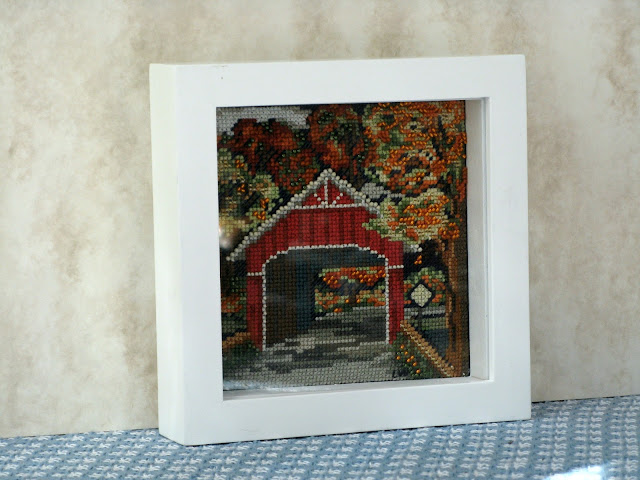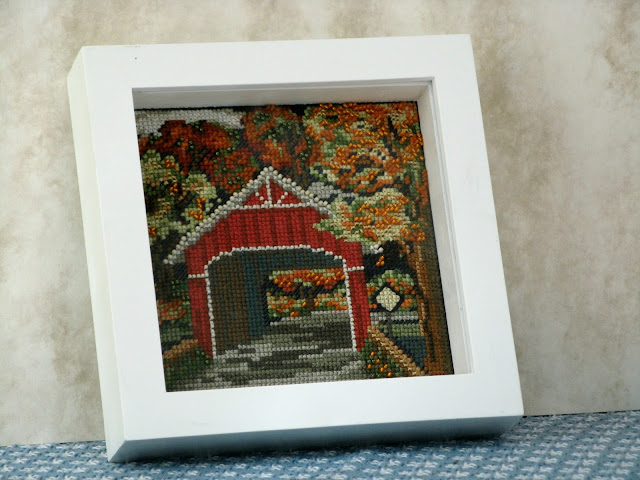
I know that I've told you many, many times that I absolutely LOVE the Fall season. There's just something about it that really inspires me and I find that when I'm looking at crafts to make I generally gravitate towards those relating to the Fall season. So, it should come as no surprise that I chose to make a Fall themed cross-stitch with my Winter creations. Instead of a house the Covered Bridge - Cross Stitch Kit had a wonderful picture of a covered bridge. Certainly one you'd expect to see in New England.
Like the other Mill Hill - Buttons & Beads Series patterns I had bought the Covered Bridge kit included the pattern, embroidery thread, perforated paper, beads, hay bundle button, 2 needles and instructions.
The Covered Bridge pattern uses full counted cross-stitch and outline stitching as well as beads and buttons for emphasis and depth. The pattern also calls for certain areas of the perforated paper to be left untouched as the background. In this case they were leaving sections of the dark blue perforated paper background untouched.

I, once again, decided to frame my finished cross-stitch picture in a 5" by 5" white shadow box frame that is 1 1/2" deep and can stand on it's own (like the picture at the top of this post) or with its back picture stand (like the picture above) as I've been really happy with the way all my other cross-stitch shadowbox pictures have come out.
I also decided to once again utilize the rectangular wood frame jig that my darling husband built for me(pictured above) that I could tape the edges of my perforated paper to. The wood frame jig is a rectangular embroidery hoop of sorts, but without bending the perforated paper. He had made it out of 1/2" x 1" pine wood strips with an adjustable center strip that I used for this 5 x 5 square design.
I had learned from previous mistakes that I needed to draw diagonal lines to locate the exact center of the perforated paper as in the last perforated paper cross-stitch picture I had done was slightly off center by a few holes which caused a problem with inserting the needles in the holes along one of the edges of my frame. So, I drew a diagonal line across each corner to get the center point of the perforated paper.
I had also run into a slight problem with one of the perforated paper cross-stitch pictures I had previously created with the beads along the edge causing a problem when framing so this time I also drew squares on the perforated paper to show me where the 5" x 5" square was. Plus, I knew I wanted to square my picture so I needed to know where to end my stitching.

While the end results of this design were wonderful some things in the kit and in the instructions could be improved upon so I'd like to offer the following constructive suggestions:
The cross-stitch chart was in black and white as was the floss color code and symbol key. Both were easy to read and very clear. While I had no problem with the chart and keys I did have a problem with the way the DMC floss was presented. All of the floss was tied together in one big knot so you had to separate the floss pieces yourself, sort them, and try to interpret which color belonged to which floss # and symbol key on the color chart. If you only have a few colors to deal with this isn't a problem. However, if you have several different colors of say beige to choose from that are close in color then interpreting the chart can be tricky. You may assign the wrong color to the wrong symbol if the colors are too closely aligned.
As I have done with other cross-stitch kits I've completed I had to design my own thread color sorter and symbol key. I took a piece of thin cardboard and cut a 1" x 9" long rectangular piece out to use as a thread sorter. I then punched 17 holes in my cardboard strip in which to tie each of the different colors. Just above the hole I wrote the DMC floss # and just below the hole I added the respective cross-stitch symbol. I then inserted the floss threads that went with that # and symbol through the hole and tied them in a loose knot. This kit could be much improved if a thread sorter with respective #'s and symbols was provided.
The beads were contained within two small ziploc bags which was fine. However, when several different beads of similar color or size are included within the bags it can be very difficult to distinguish between the colors or between the petite and regular size beads. Labeling the ziploc bags as to which bead number they contained would enhance this kit and allow you to tie the bead # to the symbol number on the charts.
The pattern called for certain areas of the perforated paper to be left untouched as the background like the picture shown below:

However, I don't like seeing the different perforated sections in the background and opted instead to finish all of the background with a dark blue DMC embroidery floss color that closely matched the color of the dark blue perforated paper and would be sewn as a half-cross stitch. And, once again, I had decided to square the edges of my picture.
Unlike all of my other shadow box pictures instead of mounting my picture on hard chipboard or cardboard I decided to mount this on a 1/4" foam chipboard piece. I thought it would help draw your eye into the shadow box picture as the foam would create a slight curve in the picture within the shadow box adding to the distance effect.
My results with the totally finished background, square edges, and foam chipboard is shown below:

The kit had included a yellow hay bundle button that didn't really look like a hay bundle and, in both hubby's and my opinion, would be a detraction from the wonderful Fall design. So I opted not to use it.
Despite the relatively small issues I had encountered with the kit I was thrilled with the way my Covered Bridge - Cross Stitch Kit turned out. There is a lot going on in a very small cross-stitch picture and it is amazing to see all the details.
It took me 32 hours to complete this picture including the framing. As always, my comments are meant to be constructive to enable future purchasers to benefit from my experience and to enhance their ability to create a wonderful little cross-stitch design.

No comments:
Post a Comment